Employee Motivation: Factors, Positive, and Negative Job Impacts
VerifiedAdded on 2023/06/05
|7
|1926
|459
Report
AI Summary
This report delves into the multifaceted reasons behind why people work, emphasizing that work extends beyond mere financial gain, offering independence, purpose, and social recognition. It identifies salary as a primary motivator while also highlighting non-monetary incentives like appreciation and opportunities for advancement. The report underscores the importance of positive relationships with colleagues, learning and development opportunities, strong leadership, work-life balance, and a conducive work environment in fostering employee motivation. It further explores the positive aspects of job roles, such as friendly co-workers, enjoyable work, and a sense of achievement, while also addressing negative factors like lack of communication, limited freedom, and inadequate recognition. The conclusion reinforces the significance of employee motivation for organizational success and growth, emphasizing the need for organizations to create environments that support and encourage their workforce.
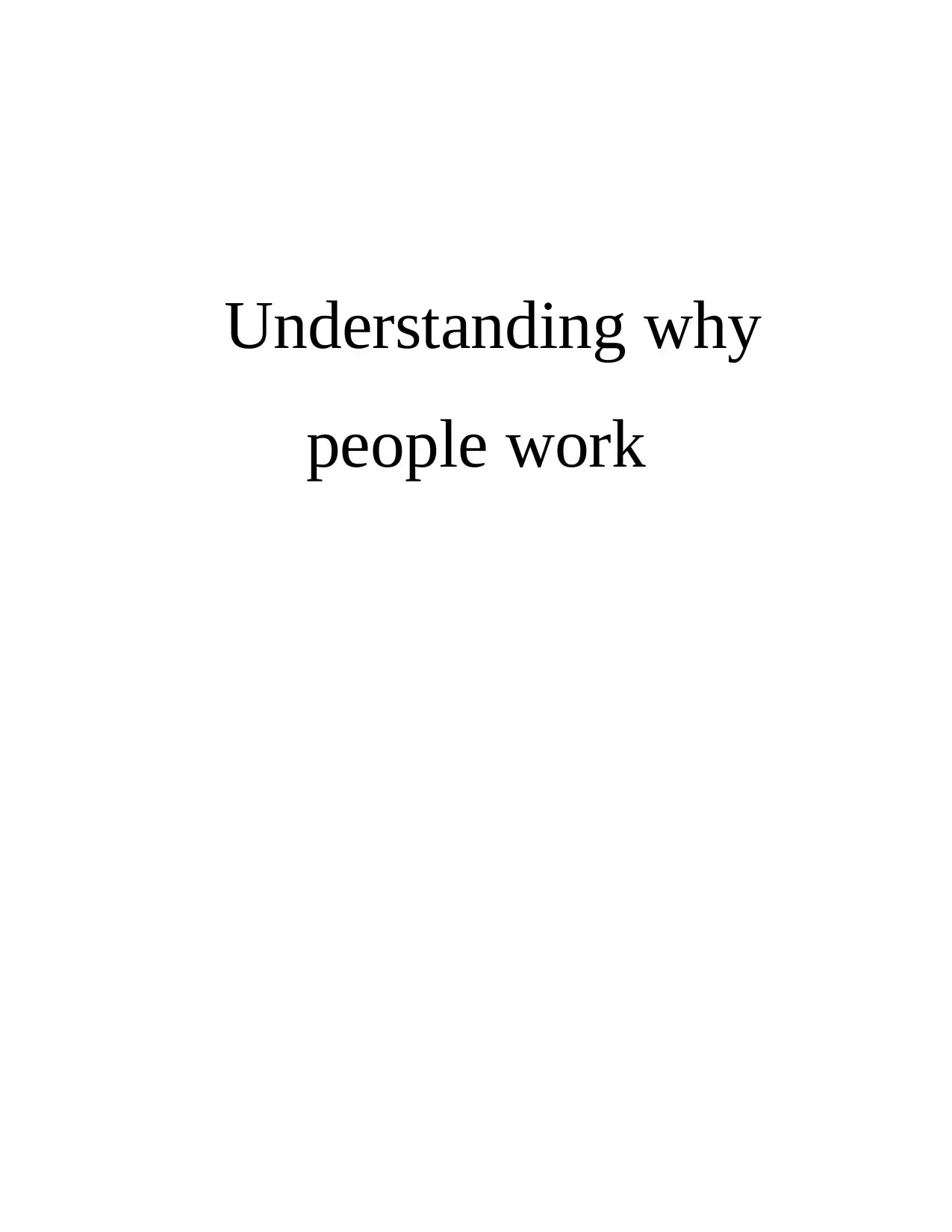
Understanding why
people work
people work
Paraphrase This Document
Need a fresh take? Get an instant paraphrase of this document with our AI Paraphraser
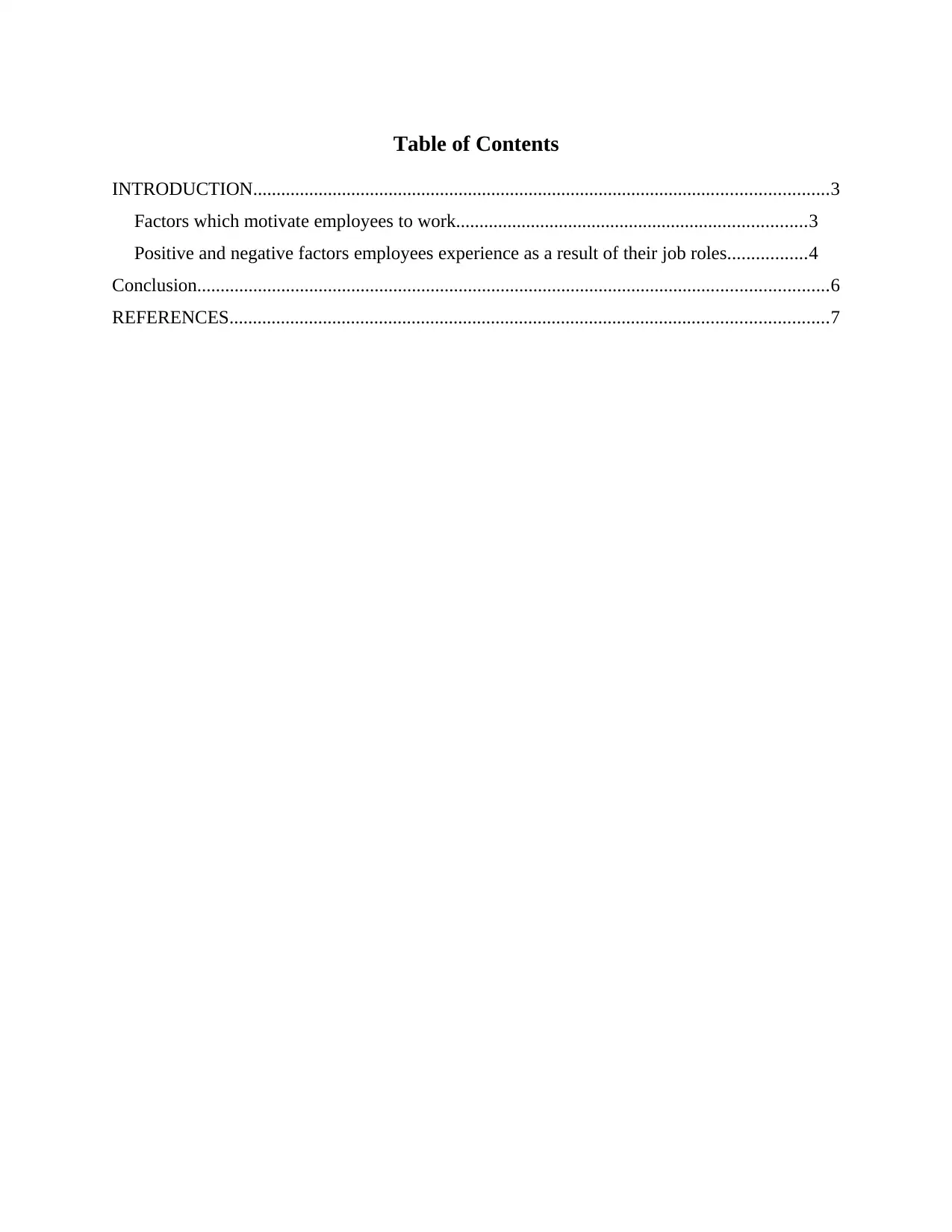
Table of Contents
INTRODUCTION...........................................................................................................................3
Factors which motivate employees to work...........................................................................3
Positive and negative factors employees experience as a result of their job roles.................4
Conclusion.......................................................................................................................................6
REFERENCES................................................................................................................................7
INTRODUCTION...........................................................................................................................3
Factors which motivate employees to work...........................................................................3
Positive and negative factors employees experience as a result of their job roles.................4
Conclusion.......................................................................................................................................6
REFERENCES................................................................................................................................7
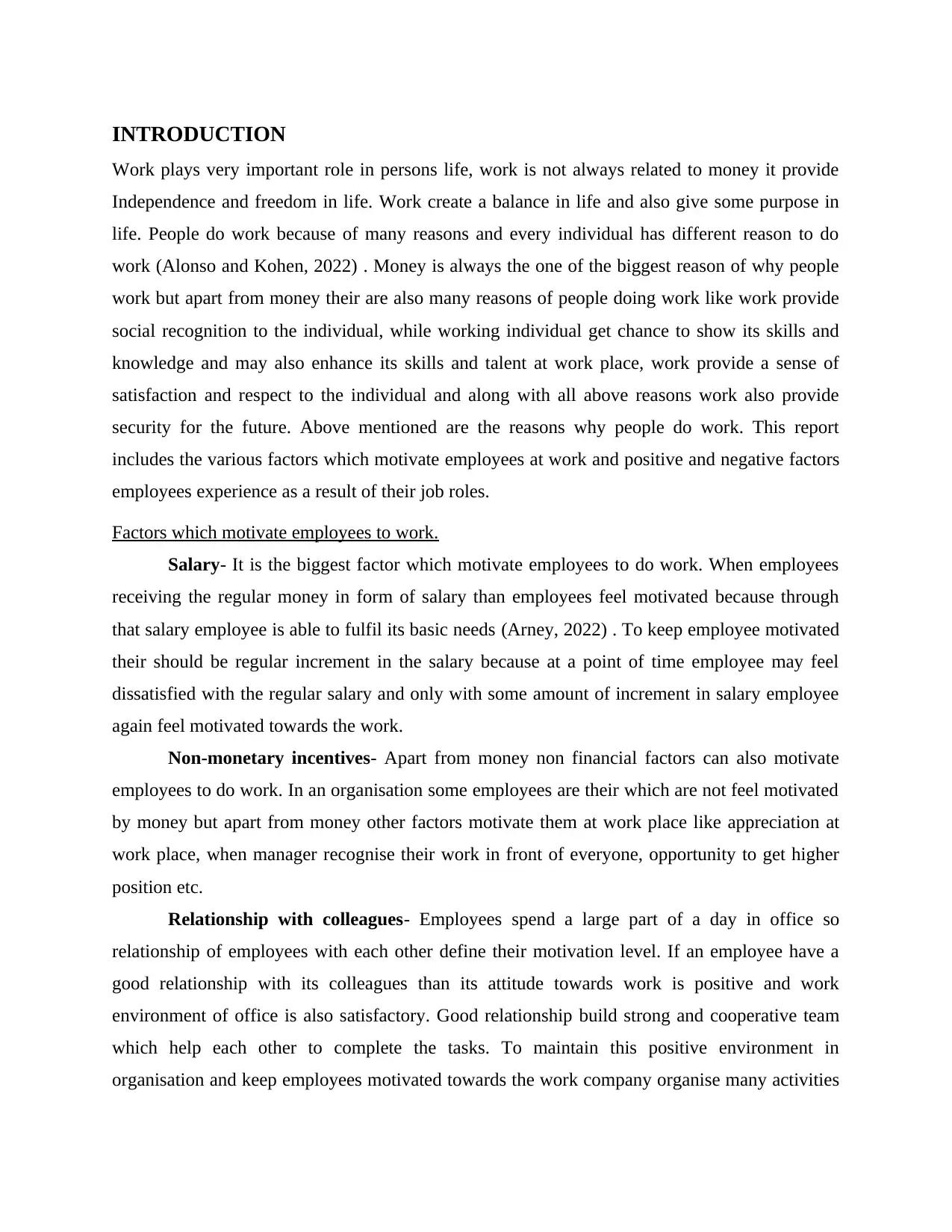
INTRODUCTION
Work plays very important role in persons life, work is not always related to money it provide
Independence and freedom in life. Work create a balance in life and also give some purpose in
life. People do work because of many reasons and every individual has different reason to do
work (Alonso and Kohen, 2022) . Money is always the one of the biggest reason of why people
work but apart from money their are also many reasons of people doing work like work provide
social recognition to the individual, while working individual get chance to show its skills and
knowledge and may also enhance its skills and talent at work place, work provide a sense of
satisfaction and respect to the individual and along with all above reasons work also provide
security for the future. Above mentioned are the reasons why people do work. This report
includes the various factors which motivate employees at work and positive and negative factors
employees experience as a result of their job roles.
Factors which motivate employees to work.
Salary- It is the biggest factor which motivate employees to do work. When employees
receiving the regular money in form of salary than employees feel motivated because through
that salary employee is able to fulfil its basic needs (Arney, 2022) . To keep employee motivated
their should be regular increment in the salary because at a point of time employee may feel
dissatisfied with the regular salary and only with some amount of increment in salary employee
again feel motivated towards the work.
Non-monetary incentives- Apart from money non financial factors can also motivate
employees to do work. In an organisation some employees are their which are not feel motivated
by money but apart from money other factors motivate them at work place like appreciation at
work place, when manager recognise their work in front of everyone, opportunity to get higher
position etc.
Relationship with colleagues- Employees spend a large part of a day in office so
relationship of employees with each other define their motivation level. If an employee have a
good relationship with its colleagues than its attitude towards work is positive and work
environment of office is also satisfactory. Good relationship build strong and cooperative team
which help each other to complete the tasks. To maintain this positive environment in
organisation and keep employees motivated towards the work company organise many activities
Work plays very important role in persons life, work is not always related to money it provide
Independence and freedom in life. Work create a balance in life and also give some purpose in
life. People do work because of many reasons and every individual has different reason to do
work (Alonso and Kohen, 2022) . Money is always the one of the biggest reason of why people
work but apart from money their are also many reasons of people doing work like work provide
social recognition to the individual, while working individual get chance to show its skills and
knowledge and may also enhance its skills and talent at work place, work provide a sense of
satisfaction and respect to the individual and along with all above reasons work also provide
security for the future. Above mentioned are the reasons why people do work. This report
includes the various factors which motivate employees at work and positive and negative factors
employees experience as a result of their job roles.
Factors which motivate employees to work.
Salary- It is the biggest factor which motivate employees to do work. When employees
receiving the regular money in form of salary than employees feel motivated because through
that salary employee is able to fulfil its basic needs (Arney, 2022) . To keep employee motivated
their should be regular increment in the salary because at a point of time employee may feel
dissatisfied with the regular salary and only with some amount of increment in salary employee
again feel motivated towards the work.
Non-monetary incentives- Apart from money non financial factors can also motivate
employees to do work. In an organisation some employees are their which are not feel motivated
by money but apart from money other factors motivate them at work place like appreciation at
work place, when manager recognise their work in front of everyone, opportunity to get higher
position etc.
Relationship with colleagues- Employees spend a large part of a day in office so
relationship of employees with each other define their motivation level. If an employee have a
good relationship with its colleagues than its attitude towards work is positive and work
environment of office is also satisfactory. Good relationship build strong and cooperative team
which help each other to complete the tasks. To maintain this positive environment in
organisation and keep employees motivated towards the work company organise many activities
⊘ This is a preview!⊘
Do you want full access?
Subscribe today to unlock all pages.

Trusted by 1+ million students worldwide
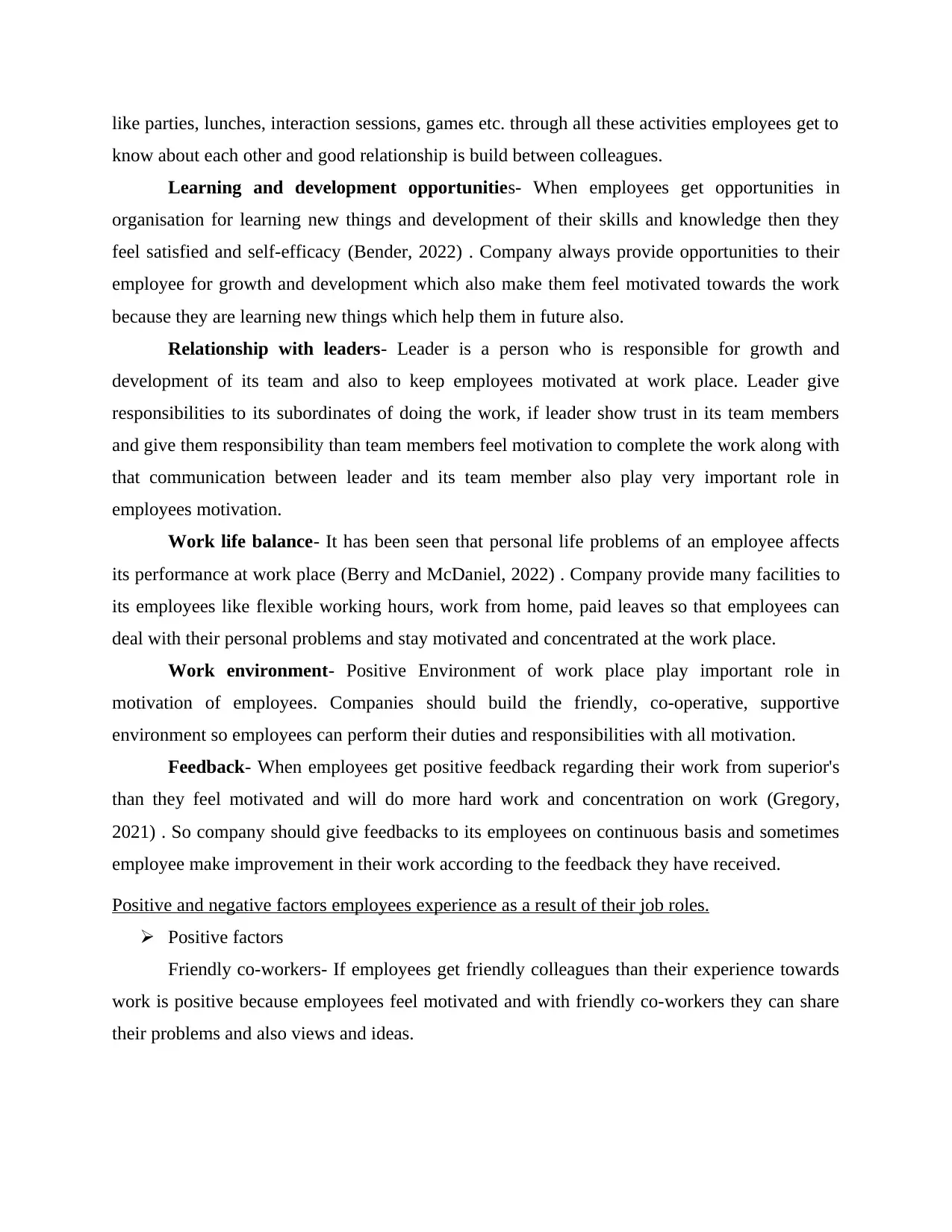
like parties, lunches, interaction sessions, games etc. through all these activities employees get to
know about each other and good relationship is build between colleagues.
Learning and development opportunities- When employees get opportunities in
organisation for learning new things and development of their skills and knowledge then they
feel satisfied and self-efficacy (Bender, 2022) . Company always provide opportunities to their
employee for growth and development which also make them feel motivated towards the work
because they are learning new things which help them in future also.
Relationship with leaders- Leader is a person who is responsible for growth and
development of its team and also to keep employees motivated at work place. Leader give
responsibilities to its subordinates of doing the work, if leader show trust in its team members
and give them responsibility than team members feel motivation to complete the work along with
that communication between leader and its team member also play very important role in
employees motivation.
Work life balance- It has been seen that personal life problems of an employee affects
its performance at work place (Berry and McDaniel, 2022) . Company provide many facilities to
its employees like flexible working hours, work from home, paid leaves so that employees can
deal with their personal problems and stay motivated and concentrated at the work place.
Work environment- Positive Environment of work place play important role in
motivation of employees. Companies should build the friendly, co-operative, supportive
environment so employees can perform their duties and responsibilities with all motivation.
Feedback- When employees get positive feedback regarding their work from superior's
than they feel motivated and will do more hard work and concentration on work (Gregory,
2021) . So company should give feedbacks to its employees on continuous basis and sometimes
employee make improvement in their work according to the feedback they have received.
Positive and negative factors employees experience as a result of their job roles.
Positive factors
Friendly co-workers- If employees get friendly colleagues than their experience towards
work is positive because employees feel motivated and with friendly co-workers they can share
their problems and also views and ideas.
know about each other and good relationship is build between colleagues.
Learning and development opportunities- When employees get opportunities in
organisation for learning new things and development of their skills and knowledge then they
feel satisfied and self-efficacy (Bender, 2022) . Company always provide opportunities to their
employee for growth and development which also make them feel motivated towards the work
because they are learning new things which help them in future also.
Relationship with leaders- Leader is a person who is responsible for growth and
development of its team and also to keep employees motivated at work place. Leader give
responsibilities to its subordinates of doing the work, if leader show trust in its team members
and give them responsibility than team members feel motivation to complete the work along with
that communication between leader and its team member also play very important role in
employees motivation.
Work life balance- It has been seen that personal life problems of an employee affects
its performance at work place (Berry and McDaniel, 2022) . Company provide many facilities to
its employees like flexible working hours, work from home, paid leaves so that employees can
deal with their personal problems and stay motivated and concentrated at the work place.
Work environment- Positive Environment of work place play important role in
motivation of employees. Companies should build the friendly, co-operative, supportive
environment so employees can perform their duties and responsibilities with all motivation.
Feedback- When employees get positive feedback regarding their work from superior's
than they feel motivated and will do more hard work and concentration on work (Gregory,
2021) . So company should give feedbacks to its employees on continuous basis and sometimes
employee make improvement in their work according to the feedback they have received.
Positive and negative factors employees experience as a result of their job roles.
Positive factors
Friendly co-workers- If employees get friendly colleagues than their experience towards
work is positive because employees feel motivated and with friendly co-workers they can share
their problems and also views and ideas.
Paraphrase This Document
Need a fresh take? Get an instant paraphrase of this document with our AI Paraphraser
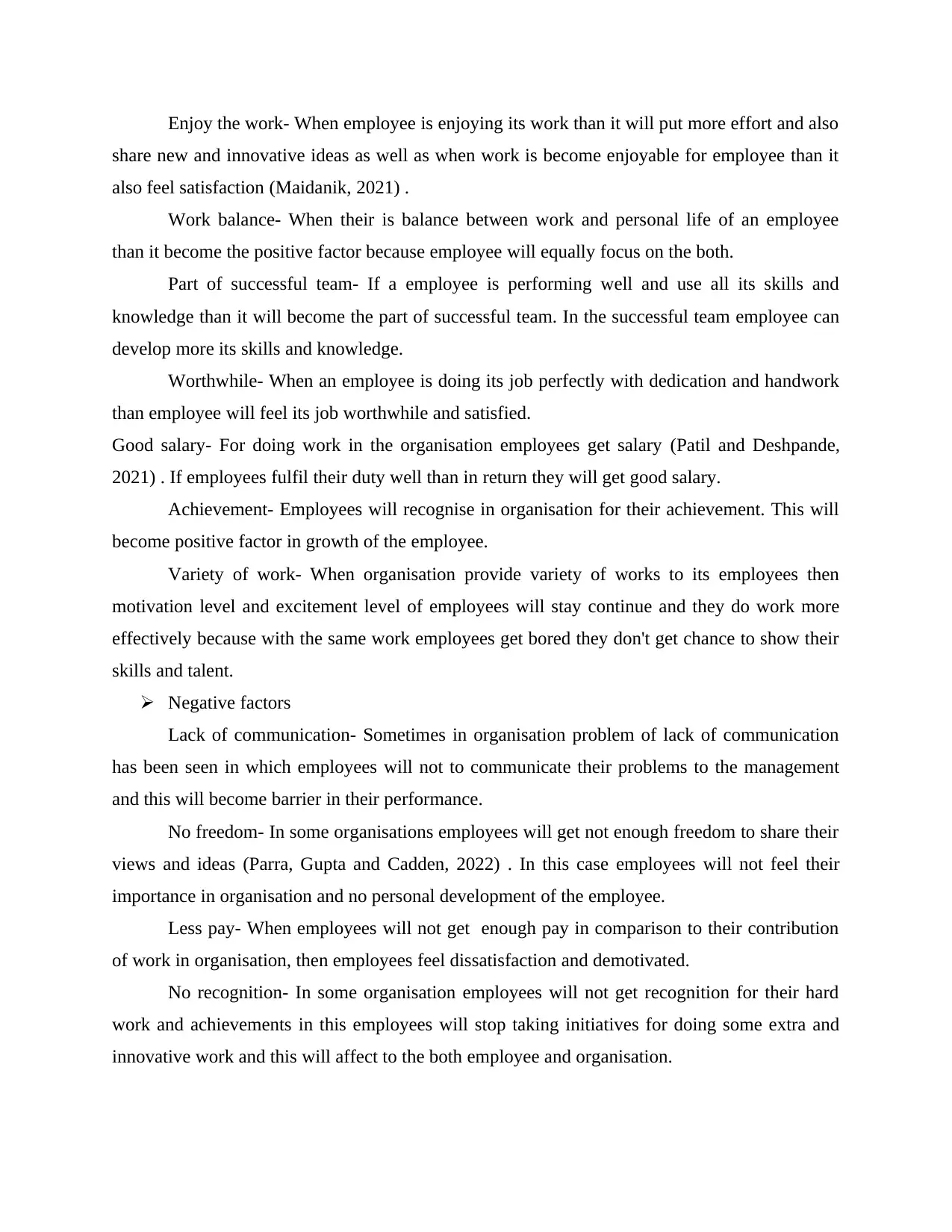
Enjoy the work- When employee is enjoying its work than it will put more effort and also
share new and innovative ideas as well as when work is become enjoyable for employee than it
also feel satisfaction (Maidanik, 2021) .
Work balance- When their is balance between work and personal life of an employee
than it become the positive factor because employee will equally focus on the both.
Part of successful team- If a employee is performing well and use all its skills and
knowledge than it will become the part of successful team. In the successful team employee can
develop more its skills and knowledge.
Worthwhile- When an employee is doing its job perfectly with dedication and handwork
than employee will feel its job worthwhile and satisfied.
Good salary- For doing work in the organisation employees get salary (Patil and Deshpande,
2021) . If employees fulfil their duty well than in return they will get good salary.
Achievement- Employees will recognise in organisation for their achievement. This will
become positive factor in growth of the employee.
Variety of work- When organisation provide variety of works to its employees then
motivation level and excitement level of employees will stay continue and they do work more
effectively because with the same work employees get bored they don't get chance to show their
skills and talent.
Negative factors
Lack of communication- Sometimes in organisation problem of lack of communication
has been seen in which employees will not to communicate their problems to the management
and this will become barrier in their performance.
No freedom- In some organisations employees will get not enough freedom to share their
views and ideas (Parra, Gupta and Cadden, 2022) . In this case employees will not feel their
importance in organisation and no personal development of the employee.
Less pay- When employees will not get enough pay in comparison to their contribution
of work in organisation, then employees feel dissatisfaction and demotivated.
No recognition- In some organisation employees will not get recognition for their hard
work and achievements in this employees will stop taking initiatives for doing some extra and
innovative work and this will affect to the both employee and organisation.
share new and innovative ideas as well as when work is become enjoyable for employee than it
also feel satisfaction (Maidanik, 2021) .
Work balance- When their is balance between work and personal life of an employee
than it become the positive factor because employee will equally focus on the both.
Part of successful team- If a employee is performing well and use all its skills and
knowledge than it will become the part of successful team. In the successful team employee can
develop more its skills and knowledge.
Worthwhile- When an employee is doing its job perfectly with dedication and handwork
than employee will feel its job worthwhile and satisfied.
Good salary- For doing work in the organisation employees get salary (Patil and Deshpande,
2021) . If employees fulfil their duty well than in return they will get good salary.
Achievement- Employees will recognise in organisation for their achievement. This will
become positive factor in growth of the employee.
Variety of work- When organisation provide variety of works to its employees then
motivation level and excitement level of employees will stay continue and they do work more
effectively because with the same work employees get bored they don't get chance to show their
skills and talent.
Negative factors
Lack of communication- Sometimes in organisation problem of lack of communication
has been seen in which employees will not to communicate their problems to the management
and this will become barrier in their performance.
No freedom- In some organisations employees will get not enough freedom to share their
views and ideas (Parra, Gupta and Cadden, 2022) . In this case employees will not feel their
importance in organisation and no personal development of the employee.
Less pay- When employees will not get enough pay in comparison to their contribution
of work in organisation, then employees feel dissatisfaction and demotivated.
No recognition- In some organisation employees will not get recognition for their hard
work and achievements in this employees will stop taking initiatives for doing some extra and
innovative work and this will affect to the both employee and organisation.
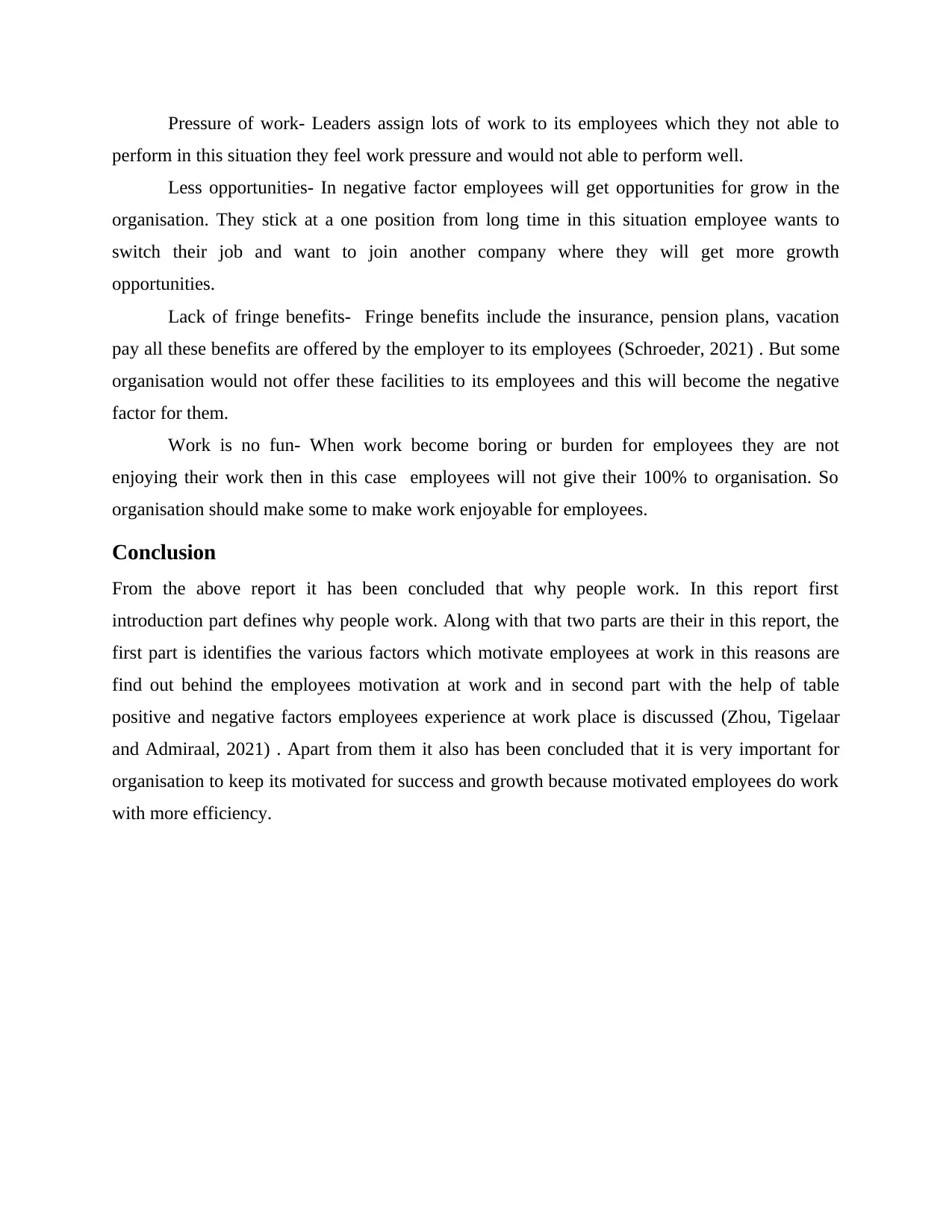
Pressure of work- Leaders assign lots of work to its employees which they not able to
perform in this situation they feel work pressure and would not able to perform well.
Less opportunities- In negative factor employees will get opportunities for grow in the
organisation. They stick at a one position from long time in this situation employee wants to
switch their job and want to join another company where they will get more growth
opportunities.
Lack of fringe benefits- Fringe benefits include the insurance, pension plans, vacation
pay all these benefits are offered by the employer to its employees (Schroeder, 2021) . But some
organisation would not offer these facilities to its employees and this will become the negative
factor for them.
Work is no fun- When work become boring or burden for employees they are not
enjoying their work then in this case employees will not give their 100% to organisation. So
organisation should make some to make work enjoyable for employees.
Conclusion
From the above report it has been concluded that why people work. In this report first
introduction part defines why people work. Along with that two parts are their in this report, the
first part is identifies the various factors which motivate employees at work in this reasons are
find out behind the employees motivation at work and in second part with the help of table
positive and negative factors employees experience at work place is discussed (Zhou, Tigelaar
and Admiraal, 2021) . Apart from them it also has been concluded that it is very important for
organisation to keep its motivated for success and growth because motivated employees do work
with more efficiency.
perform in this situation they feel work pressure and would not able to perform well.
Less opportunities- In negative factor employees will get opportunities for grow in the
organisation. They stick at a one position from long time in this situation employee wants to
switch their job and want to join another company where they will get more growth
opportunities.
Lack of fringe benefits- Fringe benefits include the insurance, pension plans, vacation
pay all these benefits are offered by the employer to its employees (Schroeder, 2021) . But some
organisation would not offer these facilities to its employees and this will become the negative
factor for them.
Work is no fun- When work become boring or burden for employees they are not
enjoying their work then in this case employees will not give their 100% to organisation. So
organisation should make some to make work enjoyable for employees.
Conclusion
From the above report it has been concluded that why people work. In this report first
introduction part defines why people work. Along with that two parts are their in this report, the
first part is identifies the various factors which motivate employees at work in this reasons are
find out behind the employees motivation at work and in second part with the help of table
positive and negative factors employees experience at work place is discussed (Zhou, Tigelaar
and Admiraal, 2021) . Apart from them it also has been concluded that it is very important for
organisation to keep its motivated for success and growth because motivated employees do work
with more efficiency.
⊘ This is a preview!⊘
Do you want full access?
Subscribe today to unlock all pages.

Trusted by 1+ million students worldwide
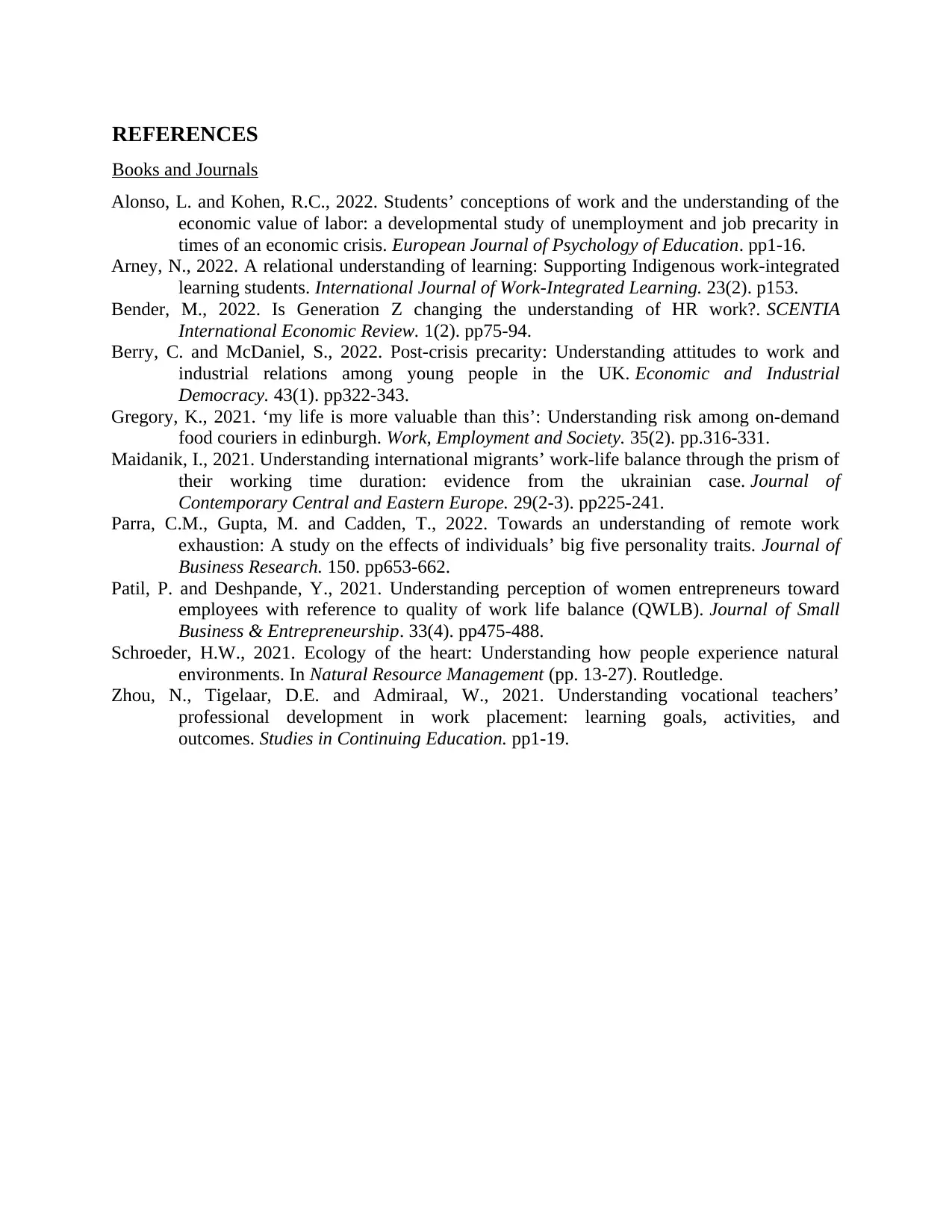
REFERENCES
Books and Journals
Alonso, L. and Kohen, R.C., 2022. Students’ conceptions of work and the understanding of the
economic value of labor: a developmental study of unemployment and job precarity in
times of an economic crisis. European Journal of Psychology of Education. pp1-16.
Arney, N., 2022. A relational understanding of learning: Supporting Indigenous work-integrated
learning students. International Journal of Work-Integrated Learning. 23(2). p153.
Bender, M., 2022. Is Generation Z changing the understanding of HR work?. SCENTIA
International Economic Review. 1(2). pp75-94.
Berry, C. and McDaniel, S., 2022. Post-crisis precarity: Understanding attitudes to work and
industrial relations among young people in the UK. Economic and Industrial
Democracy. 43(1). pp322-343.
Gregory, K., 2021. ‘my life is more valuable than this’: Understanding risk among on-demand
food couriers in edinburgh. Work, Employment and Society. 35(2). pp.316-331.
Maidanik, I., 2021. Understanding international migrants’ work-life balance through the prism of
their working time duration: evidence from the ukrainian case. Journal of
Contemporary Central and Eastern Europe. 29(2-3). pp225-241.
Parra, C.M., Gupta, M. and Cadden, T., 2022. Towards an understanding of remote work
exhaustion: A study on the effects of individuals’ big five personality traits. Journal of
Business Research. 150. pp653-662.
Patil, P. and Deshpande, Y., 2021. Understanding perception of women entrepreneurs toward
employees with reference to quality of work life balance (QWLB). Journal of Small
Business & Entrepreneurship. 33(4). pp475-488.
Schroeder, H.W., 2021. Ecology of the heart: Understanding how people experience natural
environments. In Natural Resource Management (pp. 13-27). Routledge.
Zhou, N., Tigelaar, D.E. and Admiraal, W., 2021. Understanding vocational teachers’
professional development in work placement: learning goals, activities, and
outcomes. Studies in Continuing Education. pp1-19.
Books and Journals
Alonso, L. and Kohen, R.C., 2022. Students’ conceptions of work and the understanding of the
economic value of labor: a developmental study of unemployment and job precarity in
times of an economic crisis. European Journal of Psychology of Education. pp1-16.
Arney, N., 2022. A relational understanding of learning: Supporting Indigenous work-integrated
learning students. International Journal of Work-Integrated Learning. 23(2). p153.
Bender, M., 2022. Is Generation Z changing the understanding of HR work?. SCENTIA
International Economic Review. 1(2). pp75-94.
Berry, C. and McDaniel, S., 2022. Post-crisis precarity: Understanding attitudes to work and
industrial relations among young people in the UK. Economic and Industrial
Democracy. 43(1). pp322-343.
Gregory, K., 2021. ‘my life is more valuable than this’: Understanding risk among on-demand
food couriers in edinburgh. Work, Employment and Society. 35(2). pp.316-331.
Maidanik, I., 2021. Understanding international migrants’ work-life balance through the prism of
their working time duration: evidence from the ukrainian case. Journal of
Contemporary Central and Eastern Europe. 29(2-3). pp225-241.
Parra, C.M., Gupta, M. and Cadden, T., 2022. Towards an understanding of remote work
exhaustion: A study on the effects of individuals’ big five personality traits. Journal of
Business Research. 150. pp653-662.
Patil, P. and Deshpande, Y., 2021. Understanding perception of women entrepreneurs toward
employees with reference to quality of work life balance (QWLB). Journal of Small
Business & Entrepreneurship. 33(4). pp475-488.
Schroeder, H.W., 2021. Ecology of the heart: Understanding how people experience natural
environments. In Natural Resource Management (pp. 13-27). Routledge.
Zhou, N., Tigelaar, D.E. and Admiraal, W., 2021. Understanding vocational teachers’
professional development in work placement: learning goals, activities, and
outcomes. Studies in Continuing Education. pp1-19.
1 out of 7
Related Documents
Your All-in-One AI-Powered Toolkit for Academic Success.
+13062052269
info@desklib.com
Available 24*7 on WhatsApp / Email
![[object Object]](/_next/static/media/star-bottom.7253800d.svg)
Unlock your academic potential
Copyright © 2020–2026 A2Z Services. All Rights Reserved. Developed and managed by ZUCOL.




